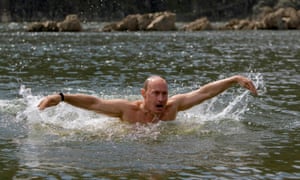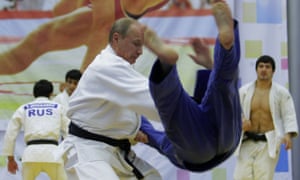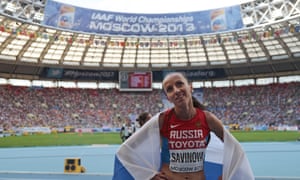This week’s report by the World Anti-Doping Agency into sport in Russia makes devastating reading. It concludes that Russia ran a huge state sponsored doping programme, sabotaged the London 2012 Olympics, and should be banned from athletics.
Some details are extraordinary. Intelligence agents were smuggled into Moscow’s scandal-hit laboratory to intimidate staff. But for anyone who has followed the changing role of sport under Vladimir Putin, the report is hardly a surprise. In fact, the doping scandal encompasses many of the key themes that have come to define Putin’s rule.
Since becoming Russia’s president in 2000, Putin has taken a close interest in sport. In part, this is down to biography: as a young man growing up in the tough streets of Leningrad, Putin took up judo to defend himself against neighbourhood thugs. He is a black belt. In contrast to the ailing Yeltsin, Putin portrayed himself as a vigorous man of action: swimming butterfly, fishing in Siberia bare-chested, flying with cranes.

But for Putin, sport is more than a pastime. It serves an ideological function. It’s an essential part of his maximal vision of Russia as a revived Great Power. In its glory days, the Soviet Union regularly topped the Olympic medals’ tables. According to Oleg Shamanayev, an editor at the major Russian newspaper Sport Express, doping in the USSR was seen as acceptable – or at least as a necessary evil.
With the Soviet breakup, sport declined. Coaches drifted off into private business. Among those who stayed, cold war attitudes towards cheating survived. The sports authorities gave jobs to athletes disqualified for doping in the 1990s and 2000s. Cross country skier Larisa Lazutina, stripped of her gold medal at the 2002 Olympics in Salt Lake City after testing positive for drugs, went on to a successful career in Moscow’s regional parliament.
Over the past decade, the acceptance of doping has diminished, but has not been completely rooted out, Shamanayev said. “Everyone was constantly saying that only the Russians were doping. We thought it would be better to lose and not dope than constantly have all these scandals. But we have old coaches, a big country, lots of athletes, a big sport industry. With so many people, there can be many different opinions.”
On the surface, Putin has been uniquely successful at bringing major international sporting events to Russia. In 2007 he flew to Guatemala and made a rare speech in English to the International Olympic Committee. The result: Russia won the 2014 Winter Olympics, hosted in the Black Sea resort of Sochi. In 2010 Putin triumphed again, this time when Fifa’s executive committee in Zurich handed Moscow the 2018 World Cup.
These victories subsequently unravelled, amid accusations of corruption and bribery. Sepp Blatter recently admitted that Fifa decided to give the World Cup to Russia before a formal vote. According to political scientist Stanislav Belkovsky, Russia and its football federation knew the result a week in advance – unlike their clueless rivals, England. Belkovsky alleges that Moscow shelled out around $50m to buy the World Cup. It was cheap, he says.

True or not, there is little doubt that Putin believes everyone has their price. Former EU leaders such as Gerhard Schröder now earn big sums as Kremlin lobbyists; Russia and Fifa – both secretive oligarchies – understand the power of money. As Gary Kasparov, the former world chess champion, puts it: “He [Putin] is a very suspicious man. If something is not being negotiated it’s a conspiracy. It’s a normal thought process for him.”
For the Kremlin, the World Cup and the Olympics bring many benefits. As well as boosting morale and patriotism, they are a way of developing the country though what Shamanayev calls the “meteorite effect”. Faced with hosting a sporting event, elites put aside their differences and work to build infrastructure and prepare for the competition. “It’s a method for mobilisation. That’s the message of our current leadership,” he said.
And, of course, they offer unrivalled opportunities for stealing. According to Boris Nemtsov, the Russian opposition leader shot dead in February outside the gates of the Kremlin, the Sochi Olympics cost $50bn. They were the most expensive Olympics in history. Of the money spent, more than half – approximately $26bn – disappeared, Nemtsov said, stolen from state budgets.
In a damning 2013 report Nemtsov wrote: “The Sochi Olympics are an unprecedented thieves’ caper. They have exposed, in concentrated form, the main flaws of the system: abuse, corruption, petty tyranny, cronyism, non-professionalism, and irresponsibility.”
The oligarchs who profited from the Sochi Games included Putin’s old judo sparring partners Boris and Arkady Rotenberg. They got $7bn in no-bid state contracts to build infrastructure, more than the entire cost of the Vancouver Games. Other members of Putin’s former judo club in St Petersburg have also become billionaires in other sectors, including oil trader Gennady Timchenko, one of several Putin “cronies” sanctioned by the US last year.
Meanwhile, Putin has used sport as a way of projecting Russian influence abroad. In 2013 the president’s judo partner Vasily Shestakov turned up as a guest at the Conservative party’s annual summer fundraising ball and shook hands with David Cameron. Shestakov is the author of Learn Judo With Vladimir Putin. His soft power mission to London was meant to improve Russia’s badly battered image in the UK.

Moscow controls several world sporting federations, including chess. Last year Kasparov, possibly the greatest player ever, tried to become president of Fide, chess’s governing body. The Kremlin’s candidate was Kirsan Ilyumzhinov, who had led Fide for 19 years. Ilyumzhinov won. A former president of the Russian republic of Kalmykia, Ilyumzhinov believes that he was once kidnapped by aliens.
For Russians, the conclusions of Wada’s report – that the head of the laboratory had demanded bribes to suppress positive doping tests – would have seemed wearily familiar. Corruption has been a feature of Russian life since the late Soviet Union. Under Putin, however, it has metastasised into a gigantic cancer, infecting every aspect of life, and leading the US in a 2010 diplomatic cable to dub Russia a “virtual mafia state”.
Corruption has degraded Russian institutions: not just sport, but education, science, politics, and medicine. Everything has a price: dodging military service; getting a place at university; enrolling your kid at a superior kindergarten; fixing an exam grade. If you are an elite athlete with a problem drug test the solution is obvious.
The Kremlin’s response to the crisis now engulfing its athletics federation is familiar too. As the Wada report makes clear, state-sponsored doping in Russia is the result of a deeply ingrained mindset, that everyone else is cheating as well. It reflects Putin’s broader world-view. He believes that there are no moral actors, that the west is cynical and duplicitous too, with Russia simply better at playing the same unscrupulous game.
Putin has announced that Russia will conduct its own internal investigation. This is likely to exonerate athletes, coaches and the state. Meanwhile, Russia’s sports minister, Vitaly Mutko, personally implicated by Wada, has dismissed the report’s conclusion as “strange”. He has lashed out at the UK, calling its anti-doping system for London 2012 “zero”. Where, Mutko asks, is the evidence? As Wada revealed, the lab director Grigory Rodchenko destroyed 1,400 samples three days before its inspectors arrived in Moscow.
Can Russia change? Sergei Iljukov, a Russian-Estonian sport doctor who works with the Finnish Olympic team, says the approach remains state-dominated. Compared to the west, the country lacks good sports scientists, physiologists, doctors and other specialists, he says. “It’s like the difference between a BMW and a Lada.”
Iljukov adds: “If there is any scandal in track and field in Great Britain, the sponsors will disappear, and everybody understands they can’t just use substances. It’s illegal, it’s against fair play, and it can hugely impact the financial side as well,” he said. “But in Russia the game still goes on, because the government pays money to the athletes, and the government is ordering the wins.”
Certainly, the omens this week have not been encouraging. Russia’s athletics coach Sergei Poirazyan called Wada’s report “yet another provocation by the decadent west”. Since Putin’s 2014 annexation of Crimea, state TV channels have been awash with the idea that Russia is the target of a western conspiracy. The doping scandal, seen from this perspective, is merely another example of Moscow’s victimhood.
Actually, there isn’t conspiracy. There are facts. The crisis gripping Russian sport isn’t caused by a perfidious western plot. Rather it’s driven by events inside Russia – and by Putin’s unswerving belief that there are no rules.
Luke Harding’s Mafia State: How One Reporter Became an Enemy of the Brutal New Russia is published by Guardian Faber



